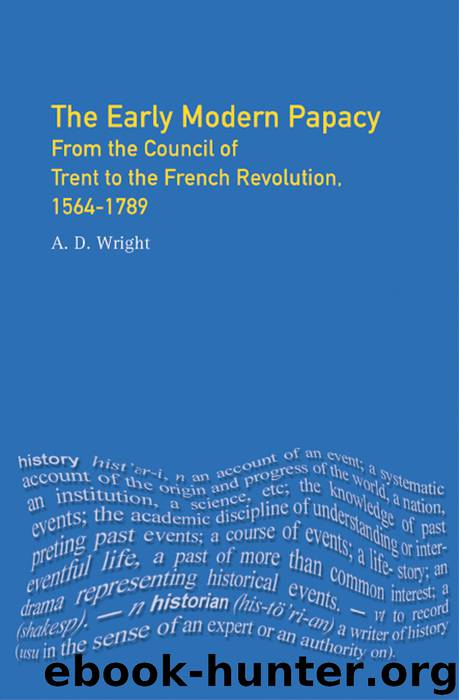The Early Modern Papacy by A.D. Wright

Author:A.D. Wright
Language: eng
Format: epub
ISBN: 978-1-317-89617-3
Publisher: Routledge
A WINDOW OF OPPORTUNITY
As has now been seen, the post-Tridentine papacy was not able to exercise a uniform authority over all the Catholics in every part of Western Christendom. Political considerations could never be entirely neglected. When, for example, Clement VIII was contemplating reversing his predecessors’ policy towards Henri of Navarre, and allowing his reconciliation, Venetian and, less openly, Medicean diplomacy sought to counter the known Spanish pressure on the pope to desist. Nevertheless, in this case, the final Roman decision to reverse papal policy was substantially independent. Clement’s perspicacity equally enabled him to keep his distance from the revived project of the duke of Savoy to subdue Calvinist Geneva, which would certainly have upset the French.
Paul V, by contrast, failed to receive the total and public support from the Catholic Courts of Europe for which he looked during the Interdict imposed on Venice. Despite Venetian fears and a degree of ostentatious manoeuvring by Spain, the chief desire of the Spanish monarchy at the time was to defend the interests of Catholic states generally from unacceptable forms of papal intervention.17 Bourbon France successfully intervened between the pope and Venice. The essence of the papacy’s difficulty in making its authority effective outside Italy was thus clearly demonstrated before the 1620s, not only with reference to France. A window of opportunity for a more independent exercise of papal authority had lasted a bare quarter-century, from the reconciliation of Henri IV and the subsequent contribution of Clement VIII to the Peace of Vervins, in 1598, which substantially ended Franco-Spanish hostilities, to the early 1620s.
The tenuous peace between the two major Catholic powers in Europe provided a brief interlude during which the papacy was no longer dangerously dependent on the Habsburgs and above all Spain, without the counterweight of an officially and ostensibly Catholic France. But though open hostilities between the major Catholic powers did not resume fully until 1635, the looming crisis over the Valtelline and the related question of the Mantuan Succession obviously revealed the new difficulty which the papacy would face from the pontificate of Gregory XV onwards. The double pressure from the rival Catholic powers of France and Spain affected the policies which Urban VIII and his successors attempted to pursue, above all in trying to settle the emerging Jansenist question. Although this doctrinal controversy began in the Southern Netherlands, under Spanish rule, it also evolved in France as a dispute over pastoral practice, and came to involve both anti-Jesuit campaigns and a challenge to papal authority itself. The efforts of Gregory and Urban to prevent the conflict between Bourbon and Habsburg were not only unavailing, therefore, but proved incapable of prolonging the moment when the papal authority necessary to resolve such a controversy might be deployed with relative freedom from political constraints.
Download
This site does not store any files on its server. We only index and link to content provided by other sites. Please contact the content providers to delete copyright contents if any and email us, we'll remove relevant links or contents immediately.
Plagued by Fire by Paul Hendrickson(17117)
The 5 Love Languages: The Secret to Love That Lasts by Gary Chapman(9293)
How to Bang a Billionaire by Alexis Hall(7938)
Wonder by R. J. Palacio(7747)
The Institute by Stephen King(6807)
The Space Between by Michelle L. Teichman(6581)
The Testaments by Margaret Atwood(6521)
The Thirst by Nesbo Jo(6446)
Assassin’s Fate by Robin Hobb(5862)
Wiseguy by Nicholas Pileggi(5324)
The Night Circus by Erin Morgenstern(5041)
Spare by Prince Harry The Duke of Sussex(4799)
Bittersweet (True North #1) by Sarina Bowen(4719)
The MacArthur Bible Commentary by John MacArthur(4656)
The Templars by Dan Jones(4561)
Everything Happens for a Reason by Kate Bowler(4480)
Tuesdays with Morrie by Mitch Albom(4411)
Gerald's Game by Stephen King(4382)
Royally Matched (Royally Series) by Emma Chase(4205)
